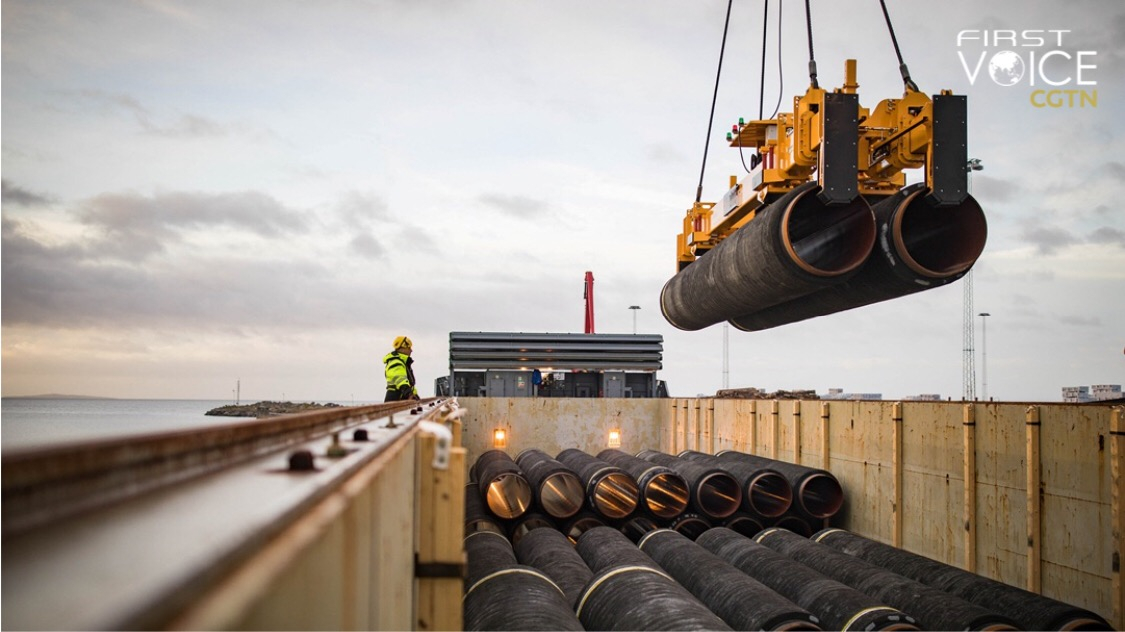US eyes its own interests by sanctioning rivals and allies alike
CGTN | Updated: 2019-12-23 10:46

Editor's Note: CGTN's First Voice goes beyond the headlines to dissect, examine and analyze hot-off-the-press issues and break down breaking news into simple bits. The daily column offers a Chinese perspective on global current events to help you shape your views on matters that shape your life.
Rivals and allies of the US are unhappy with its new National Defense Authorization Act (NDAA).
The bill authorizes sanctions against individuals and companies involved in the Nord Stream 2 pipeline, which transports natural gas from Russia to Germany under the Baltic Sea. The project is funded by a consortium of European companies. The NDAA's sanction is having an impact on their interests and the interests of their parent countries.
Europe is united in its response. Spokesman for the European Union expressed the bloc's opposition to sanctions against "EU companies conducting legitimate business." German Chancellor Angela Merkel stated that Germany is "opposed to extraterritorial sanctions." German Foreign Minister Heiko Mass equated the sanction to "interference in autonomous decisions taken in Europe" and claimed that "European energy policy is decided in Europe, not the US" Chancellor Merkel's spokeswoman said this act "constitute an interference in our internal affairs." Russia's foreign ministry accused the US of promoting ideology at the expense of global competition.
The US is justifying its actions in the name of security and independence. US President Donald Trump has long accused Germany of being subdued by Russia because of Germany's reliance on Russian energy. He described the deal as turning Germany into Russia's "hostage." A Russia-controlled Germany, as the US speculates, could tip the political inclination of the European continent to Russia's side.
Germany does lack natural gas resources. It is the world's largest natural gas importer, importing 92 percent of its gas from other countries. In the latest account, Germany imports 35 percent of its gas from Russia. The Nord Stream 2 is expected to be able to double the volume of gas Russia sends directly to Germany. This would make Russia a substantially larger exporter to Germany than other nations are. And with Russia already being the supplier of 37 percent of Europe's natural gas, the pipeline does make Russia's energy cooperation with the European Union closer. The US seems to be concerned by this expanding relationship between Russia and European countries.
However, this argument doesn't legitimize the sanctions. Natural gas only accounts for less than 24 percent of Germany's energy production in 2018. Renewable energy like wind and solar are rapidly overtaking other forms of energy production. According to Reuters, in 2018, over 40 percent of electricity was produced by green energy sources.
And Russia is rich in gas! It's just a fact. Free market decides that there is a supply-demand relationship. Given Germany's lack in gas and the proximity to Russia, it is more than natural for the two countries to conduct energy business.
There is a theory that the sanctions are motivated by US' desire to enlarge its own energy exports to Europe. After the breakthrough in the shale gas technology, the United States has overtaken Russia and Saudi Arabia as the world's top energy producer.
However, US energy companies are still in the process of preparing for exports to Germany. According to US Secretary of Energy Dan Brouillette, these companies are trying to get the preparation done and start exporting by 2022, two years after the Nord Stream 2 is expected to come online. Delaying the project could earn the US energy more market space in Germany.
However, sanctioning the pipeline could also be a leverage to keep Russia in check. Trump's decision to withdraw troops from Syria has left the room for Turkey and Russia to move in and fill the power vacuum. This resulted in a closer relationship between Turkish President Recep Tayyip Erdogan and Russian President Vladimir Putin. And their role in the Middle East has grown since.
The US Congress was livid about this. Democrats and Republicans have been vocal in their opposition to Trump's decision. But, without the Executive Branch's cooperation, countering Russia is hard for Congress to achieve alone.
The NDAA gives Congress the chance to make its strongest demand on foreign policy. By sanctioning the pipeline, Congress not only prevents Russia from getting more profit from selling energy and contains the so called "Russian threat," but also gains a tool to leverage the United States into a stronger position in the Middle East.
The sanctioning of Nord Stream 2 doesn't happen without context. There could be lots of energy and strategic benefits for the United States by impeding this project. What's worrisome is that this act not only hurts their adversaries, but also damages its most important ally on the European continent.
And a country that blatantly interferes in its allies' affairs and hurt their interests solely for its own benefits is dangerous.
























